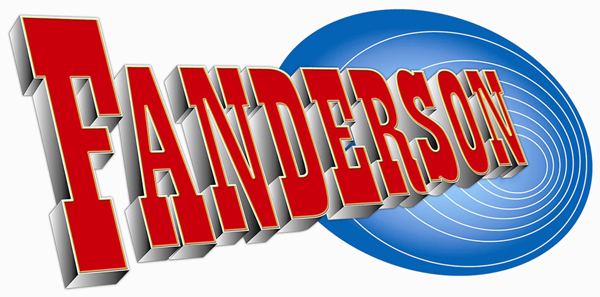Francis Matthews, the actor and voice artist who provided the voice for the title character in Gerry Anderson’s 1967 series Captain Scarlet And The Mysterons, died on June 14th at the age of 86.
Born on 2nd September 1927 in York, and educated at St. Michael’s College, Leeds, Francis remained proud of his Yorkshire roots, his skill at accents giving him the ability to play any class and virtually any nationality.
He is best known today for his work on the Century 21 series, a source of some frustration to the actor, who was a major star of British and European W and had a long and distinguished stage career.
Francis Matthews worked alongside some of the legends of acting in his film career, appearing with Boris Karloff and Christopher Lee in Corridors of Blood (shot in 1958 but not released until 1962). He acted with Peter Cushing in 1958’s The Revenge Of Frankenstein and also in Robert S. Baker and Monty Berman’s 1961 production The Hellfire Club, in later years telling amusing tales of the shooting of that film’s stronger ‘continental’ version. He appeared again with Christopher Lee in the 1966 Hammer production Dracula – Prince of Darkness, sustaining a back injury that would stay with him for the rest of his life. The two acted together in Hammer’s Rasputin: The Mad Monk, shot back to back wide the Dracula movie on the same sets.
Francis also worked often with famous British comedy duo Morecambe and Wise, becoming a dose friend of Eric Morecambe and appearing in two of the feature films the pair made for Rank, 1965’s The Intelligence Men and the following year’s That Riviera Touch. He also appeared memorably in several episodes of their celebrated 1970s BBC television series, sending up his image as an urbane amateur detective.
This image had been forged thanks to his very successful W series Paul Temple, a co-production between the BBC and the West German broadcaster ZDF. This lasted between 1969 and 1971 and was highly successful in the UK, despite serious production problems during the making of the first series. It was an even bigger success in Germany, where adaptations of author Francis Durbridge’s mystery serials on radio had been hugely popular during the 1950s and 60s. Paul Temple ended after three years, despite the German partners being keen on more episodes. There were disagreements on the tone of the series, the Germans favouring a tougher approach, and Matthews was told by BBC management that the series was too populist for their tastes.
By this point Francis’ voice, as well as his face, was familiar to television viewers, as Captain Scarlet had become a staple of the ITV network since its debut in September 1967. Seeking an acceptably mid-Atlantic but recognisably English accent for his hero, Matthews’ Cary Grant voice was eventually settled on. The actor claimed that he was approached precisely because he could do a very acceptable Cary Grant voice, while Gerry Anderson, in his official biography, stated that a few different accents were tried before the final decision was made. Whichever way events transpired, Captain Scarlet gained a voice that was perfect for the new-style puppets, a controlled performance which gave emotion to puppets which were less expressive than the previous types used in the Anderson shows. A ‘bigger’ performance could easily have overwhelmed the visuals and wouldn’t have worked nearly as well. Although he appeared at several Gerry Anderson conventions, he remained somewhat bemused by the loyalty and awed reactions of some fans to his presence.
Francis also appeared in several cult TV programmes, appearing opposite Tony Hancock in a 1963 episode of his ITV sitcom Hancock, written by Terry Nation. He can also be seen in The Saint episodes The Noble Sportsman (1964) and To Kill A Saint (1967, also featuring Thunderbirds voice artist Peter Dyneley), with his friend Roger Moore, who claimed to him that Captain Scarlet looked just like him! He worked again with Roger Moore in the 1969 feature film Crossplot, alongside UFO cast members Alexis Kanner and Gabielle Drake. Fans of The Avengers can also see Francis in the episodes The Thirteenth Hole (1966) and Mission…Highly Improbable (1967).
In the 1970s he was often cast in BBC comedy series, such as Middlemen, A Roof Over My Head (both 1977) and Don’t Forget to Write. which ran from 1977 to 1979. Best remembered, though, is Alan Plater’s Trinity Tales, from 1975, which recast Chaucer’s Canterbury Tales among a group of Rugby fans travelling to a cup final.
His long stage and screen career continued, with major theatrical roles including Henry Higgins in My Fair Lady and Hen Schultz in Cabaret, alongside Honor Blackman. He also returned periodically to screen acting, with semi-regular roles in The Royal and its sister series
Heartbeat, and a regular part in the 2005 Rik Mayall sitcom All About George. His last screen role was in the 2012 film comedy Run For Your Wife, which featured cameos from a dizzying array of British acting talent.
Francis was married to actress Angela Browne from 1983 till her death in 2001. He is survived by their three children, five grandchildren and his younger brother, actor Paul Shelley.
Originally published in FAB 78.
